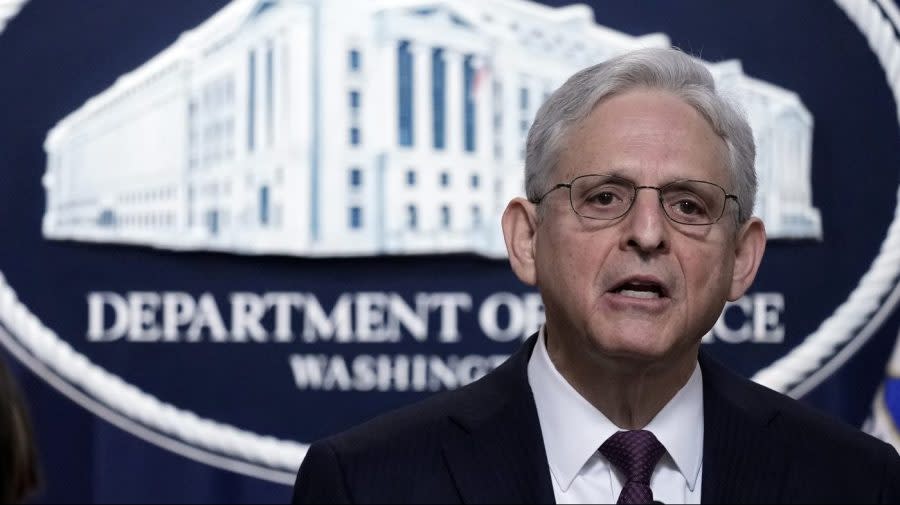Jim Jordan launches probe into lack of arrests in protests outside Supreme Court justices’ homes
- Oops!Something went wrong.Please try again later.
House Judiciary Committee Chair Jim Jordan (R-Ohio) launched an investigation into directions given to U.S. marshals to not arrest protesters outside Supreme Court justices’ homes after a draft decision overturning federal abortion protections was leaked.
He pointed to a federal law that prohibits demonstrations that intend to interfere with or influence judges.
The probe comes a year after the bombshell leak of a Supreme Court draft opinion in Dobbs vs. Jackson Women’s Health that overturned Roe v. Wade, which sparked protests outside the homes of conservative justices.
In a letter requesting information from U.S. Marshals Service Director Ronald L. Davis, Jordan referred to training materials that directed marshals to not arrest those demonstrating outside justices’ homes.
“The training materials provided to the U.S. Marshals strongly suggest that the Biden Administration is continuing to weaponize federal law enforcement agencies for partisan purposes,” Jordan wrote in the letter, first shared with The Hill.

House Judiciary Committee Chair Jim Jordan (R-Ohio), center, Rep. Jerry Nadler (D-N.Y.), left, Rep. Darrell Issa (R-Calif.), second from right, and Rep. Matt Gaetz (R-Fla.), right, take their seats before a House Judiciary Committee Field Hearing on April 17 in New York. (AP Photo/John Minchillo)
Federal law 18 U.S.C. § 1507 prohibits “pickets or parades in or near a building housing a court of the United States, or in or near a building or residence occupied or used by such judge, juror, witness, or court officer” when it is “with the intent of interfering with, obstructing, or impeding the administration of justice, or with the intent of influencing any judge, juror, witness, or court officer.”
“While authorities apprehended the man who intended to do harm to Justice Kavanaugh, we are aware of no other arrests or charges for agitators demonstrating outside of the justices’ homes—despite the actions clearly violating federal law,” Jordan said in the letter, referring to a June 2022 arrest of a man who authorities say threatened to kill Justice Brett Kavanaugh and was found outside his home with a gun, hammer, knife and pepper spray.
Sen. Katie Britt (R-Ala.) in a March Senate Appropriations subcommittee hearing unveiled training slides for U.S. marshals who were assigned to protect the homes of Supreme Court justices.
The slides said the federal statute “directly implicates activities that also involve the [First Amendment] right to free speech, to assemble, and to petition the government,” interpreting the statute’s language of “intent of influencing any judge” as applying to “criminal threats and intimidation, not 1st A protected protest activities.”
Roberts struggles to keep Supreme Court out of ethics fight
“Avoid, unless absolutely necessary, criminal enforcement actions involving the protest or protestors, particularly on public space,” another slide said.
“Do not engage in protest-related enforcement actions beyond that which are strictly and immediately necessary and tailored to ensure the physical safety of the Justices and their families,” another slide said.
Attorney General Merrick Garland had said in a Senate Appropriations subcommittee hearing earlier in March that marshals had the authority to arrest demonstrators under that statute.

Attorney General Merrick Garland speaks during a news conference at the Justice Department in Washington, April 14. (AP Photo/Susan Walsh)
“The marshals have been advised, and they know — the marshals on the ground have full authority to arrest people under any federal statute including that federal statue, but they have to make the determination on the ground whether they can do that in a manner that is safe and able to protect their main mission,” Garland said.
When Britt presented the slides to Garland later in the month, he responded that he had never seen those materials. Garland noted that he was “the first Attorney General who’s ever ordered the marshals to protect the residences of the justices and protect them 24/7.”
“But that doesn’t mean that they are in any way precluded from bringing other kinds of arrests,” Garland said.
The Judiciary Committee chairman requested documents and communications between the U.S. Marshals Service and the Department of Justice, the U.S. Attorney’s Office for the District of Maryland, the U.S. Attorney’s Office for the Eastern District of Virginia, and the Executive Office of the President about enforcement of the statute from May 2, 2022 — the date of the Supreme Court opinion leak — to the present. Jordan requested the information by 5 p.m. May 17.
The U.S. Marshals Service said they had received and were reviewing Jordan’s letter but had no immediate comment.
For the latest news, weather, sports, and streaming video, head to The Hill.

